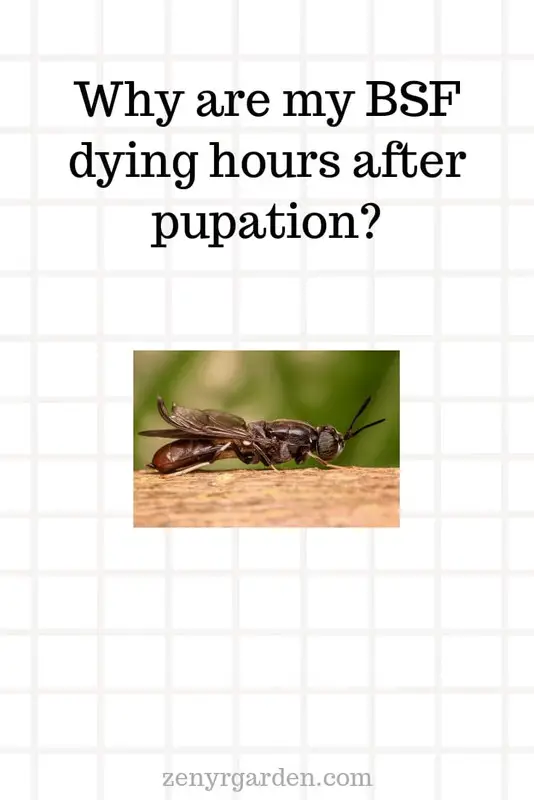Many growers have experienced the early death of black soldier flies sometimes only hours after pupation. In the morning the flies buzz around & land on the netting around the cage. When it's near noon or in the afternoon, the flies slowly die off & fall down to the ground. These black soldier flies never mate or lay any eggs. Let's see what might be going on.
Immature Crawl-Offs
Usually, in a feeding box, the little cream larvae that we see spend most of their time digging into the food. They almost never crawl out of the box or to the sides if there's good space and good food for them. The only ones that move out naturally are the blackened larvae that have eaten enough.
That being said, when you notice some cream larvae moving out to the edges or out of the bin, we know something might be going on. Otherwise, they'll be gathering inside enjoying their food.
You can see an example in the pic below. The cream larvae are trying to move out & crawl off a cliff. It's a bit blurry, sorry folks, as these guys wiggle non-stop. The reason why they are self-evacuating may be because of the heat issue or over-population.
/larvae-crawling-off-a-cliff.jpg)
If it gets too hot in the box, the cream larvae will naturally move out to the sides to find a cooler place. This may cause the larvae to pupate early, or in this case, people call them immature crawl-offs. Even though they may still turn into blackened pupae & eventually flies, these guys are very weak. Which may explain for their early death after pupation.
Over-population may cause the temperature to rise, especially in an environment with thousands of heat-generating wiggling larvae. In one feeding box where a grower feeds them with oatmeal, it could get up to 43C (110F) in the center of the box.
The growing medium may also be a contributor to the heat. Rice bran, for example, tends to retain quite a bit of heat. The larvae poop, if left unfiltered, may also heat up the space. If this happens, mix in some beer grains, spray some water to cool it down or filter the poop out. We can also divide the larvae out to other boxes to keep the heat down.
The other aspect that could lead to early crawl-offs is the lack of food for the larvae. Again, this may be tied to the over-crowded growing space where there's not enough food for everyone. The larvae near the bottom may not get enough food or oxygen as the larvae on the top. When they crawl out early & pupate, their health inevitably will be weaker than the fully mature ones. You could turn the food sometimes with a windshield wiper or trowel so the food is evenly distributed. A non-sharp tool can help not to cut or damage the larvae.
Also, regarding this early death after pupation, look out for the:
Chemicals
Check around for any chemicals that may be harmful to the adult flies. Although young cream larvae are quite resilient, the adult flies are more chemically sensitive. Maybe it's the ant spray or some other insecticide stuff that may get carried around by the wind.
It may be the pesticides in the foods they eat. As a small note, if you feed the larvae apples, you could possibly soak the apples in clean water for about 20-30 minutes, it will help remove some of the pesticide residues. I'm not sure yet if this could work for other types of veggies or if soaking them in EM or salt could help reduce the harmful stuff or undesirable bacteria.
Or more specifically it could be the insecticide treated directly on the net where the BSF usually land. Because for some net (like mosquito netting), they treat it with chemicals to kill the insects and prevent malaria. The BSF may die by just having a sniff of this stuff around.
Natural Environment
Sometimes, it's not because of the density of the growing larvae but it may just be the natural weather in the local area. For example, in some places it may get too hot during some time of the year (e.g. heat waves in the summer). When this happens, we may see a mix of cream & blackened larvae crawling out to the harvesting box. This also leads to early crawl-offs, which may then die young because of their weaker physical health.
As this can be seasonal, you can prepare before the heat waves come. Some folks use the ice packs in the fridge to cool the feeding box down. Or when it's that time of the year that you know it will be hot, space the larvae out & provide full shade for them. You could also spray some water to hydrate the flies or make it cool down. Doing these little things can help the larvae grow up strong after pupation. It maximizes the chances of successful breeding & egg laying.
Share or pin this post!


